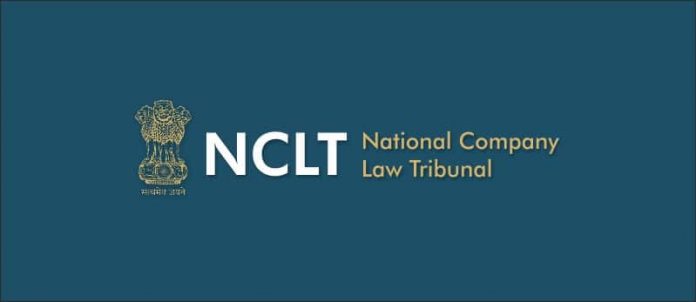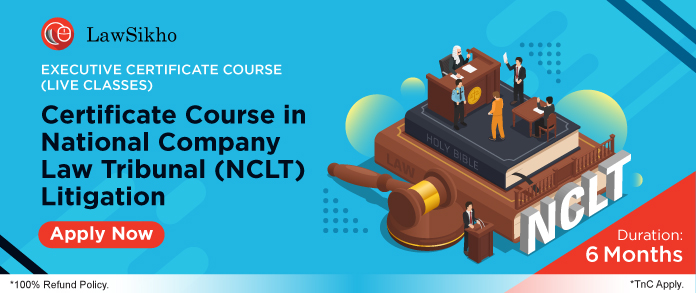This article is written by Amarpal Singh who is pursuing a Certificate Course in National Company Law Tribunal (NCLT) Litigation from LawSikho.
Table of Contents
Introduction
There are a lot of issues that have arisen with respect to jurisdiction after the operationalization of National Company Law (hereinafter NCLT). The one out of several issues that popped up was whether the NCLT has jurisdiction to enquire into fraud and adjudicate over the matters in the realm of public law.
The issue arose as the NCLT has jurisdiction to adjudicate on the matters which are incidental to the insolvency resolution process and liquidation proceedings of the corporate debtor under Section 60(5) of Insolvency and Bankruptcy Code, 2016 (IBC). It also has powers to impose punishment and penalty for fraudulent and malicious initiation of insolvency proceedings under Section 65 of IBC. At one such instance NCLT while exercising its jurisdiction and powers provided under the IBC had to deal with matters falling in the realm of public law and fraud.
The article aims to settle and critically analyze the issue by referring to various judicial decisions and provisions of IBC.
Judicial Decisions
In the case of Beacon Trusteeship Limited. v. Earthcon Infracon Private Limited, the Supreme Court of India while deciding on the issue whether the respondent had colluded and fraudulently initiated insolvency proceedings against the corporate debtor held that if such an allegation is raised, then the NCLT must enquire into the allegation by virtue of Section 65 of the Code.
Case Study: In the case of M/s Embassy Property Development Pvt Ltd. v. State of Karnataka & Ors, before the NCLT (Chennai), the financial creditor (M/s Adhyayan Investment Pvt Ltd) filed an application under Section 7 of IBC against the corporate debtor (M/s Tiffin Barytes & Paints Ltd). The NCLT admitted the application and passed an order on 12.03.2018 for initiation of the corporate insolvency resolution process (hereinafter referred as “CIRP”) against the corporate debtor, whilst imposing a moratorium under section 14 of IBC.
When the CIRP was ordered by the NCLT, the corporate debtor was holding a mining lease that was due to expire on 25.05.2018. Due to the moratorium imposed by NCLT, the Interim Resolution Professional (hereinafter referred as “IRP”) issued a letter to the Director of Mines and Geology, Karnataka informing him about the commencement of CIRP and thereafter, again issued a letter/ application to the same authority for seeking an extension of mining lease up to 31.03.2020 in pursuant to the relevant provision of Mines and Minerals (Development and Regulation), Act 1957 (hereinafter referred as “MMRD Act”).
The IRP did not receive any response to his letter seeking an extension of the mining lease. Subsequently, he filed a writ petition before the High Court of Karnataka. During the pendency of the writ petition Government of Karnataka rejected the application for extension of the mining lease. Thereafter the order was passed, and the IRP withdrew the writ petition and filed a Miscellaneous Application before the NCLT (Chennai) challenging the order of the Government of Karnataka.
The Government of Karnataka contended before the NCLT that it does not have jurisdiction to adjudicate upon the matter falling in the realm of MMRDA Act, 1974, and the entire CIRP was initiated fraudulently and in collision with related parties take the benefits of the lease deed. The NCLT while passing the order set aside the rejection order and directed the Government of Karnataka to execute supplemental lease deeds.
Aggrieved by the decision of NCLT, the Government of Karnataka filed a writ petition before the High Court of Karnataka. The High Court of Karnataka stayed the operation of the impugned order of NCLT. The RP, corporate debtor, the committee of creditors (hereinafter referred as “COC”), and resolution applicant filed a special leave petition before the Supreme Court of India challenging the order of the High Court of Karnataka.
The Supreme Court of India dealt with the following issues in the Special Leave Petition:
- Whether the High Court was right in entertaining the writ petition when there was an efficacious alternative remedy available, to approach the NCLAT under Section 61 of IBC against the order of NCLT?
- Whether NCLT and NCLAT have the power to enquire into the question of fraud?
It was held in this case that the High Court of Karnataka was right in entertaining the writ petition as the dispute between the parties revolved around the decision of statutory authorities and could only be corrected by administrative actions.
The Supreme Court while deciding the issues made a distinction between private law and public law. The court in its judgment stated that IBC is a private law remedy. The IBC settles private disputes between the parties.
Whereas, the MMRDA Act, 1974 is an act of parliament that gives power to the government to issue or cancel mining licenses. Section 2 of the MMRD Act, 1974 states that it is in the public interest that the Central Government should take the regulation of mines and development of minerals. Thus, it can be concluded that the MMRDA Act, 1974 has been enacted in the public interest and falls under the realm of public law.
On the basis of the above distinction, the Supreme Court of India held that only a superior court that is vested with the power of judicial review over administrative action can adjudicate on the correctness of action taken within the realm of public law. Further, it stated that NCLT is a creation of special statute, can exercise only those functions which are provided under IBC. It cannot be elevated to the status of the Higher Court to exercise the power of judicial review over administrative actions.
Additionally, the Supreme Court of India in the judgment observed that the High Court should make the distinction between lack of jurisdiction and wrongful exercise of jurisdiction by the lower court/tribunal/authority whose decision is challenged before the High Court. If it is the case of lack of jurisdiction then the High Court should not hesitate to exercise judicial review under Article 226 of the Constitution of India.
Further, it was held that the NCLT will have jurisdiction to inquire into the allegations of fraud by virtue of Section 65 of IBC.
IBC Amendment Act, 2020
After the judgment, IBC Amendment Act, 2020 was notified by the Central Government through notification vide dated 13.03.2020. Vide this amendment an explanation was inserted in Clause 1 of Section 14 which states that any public authority cannot suspend or terminate any license/permit on the ground of insolvency proceeding. If such an order is passed by any public authority, then such order will be non–est in law. The explanation has also granted the power to the NCLT to entertain application against such order and pass necessary direction/order as the case may be.
After a bare reading of the explanation it may seem that legislature overruled the decision of the Supreme Court of India. However, the legislature did not overrule the decision of the Supreme Court by giving powers to NCLT to adjudicate on the issues in the realm of public law. The explanation was added pursuant to the objective of the Code. It only gives power to NCLT to adjudicate upon such orders if the suspension is ordered on the ground of insolvency. If the order is passed on any other ground other than insolvency then, the NCLT will not have jurisdiction to entertain such application. The NCLT still can’t exercise the power of judicial review and adjudicate over matters in the realm of public law.
Analysis
Section 60(5) of IBC grants exclusive jurisdiction to the NCLT with respect to insolvency proceedings of the corporate debtor which is stated as follows-
“Notwithstanding anything to the contrary contained in any other law for the time being in force. The NCLT will have jurisdiction to entertain and dispose of:
- Any application filed by or against the corporate debtor or corporate person.
- Any claim made by or against the corporate debtor or person, including claims by or against any of its subsidiaries.
- Any question of priorities or question of law or facts arising out of or in relation to the insolvency resolution or liquidation proceedings of the corporate debtor or corporate person under this code.”
Further, Section 238 of IBC states that the provisions of IBC will affect, notwithstanding anything contrary stated in any other law for the time being in force or any instrument, affecting by virtue of any such law. After referring to the above provision it can be concluded that NCLT can only have jurisdiction to adjudicate over the matters which are related to insolvency resolution or liquidation proceedings of the corporate debtor. It cannot have jurisdiction over the matters in the realm of public law.
Section 65 of IBC deals with fraudulent and malicious initiation of the insolvency process. The NCLT has the power to inquire about the fraudulent trading carried out by the corporate debtor under Section 66 and Section 69 provides for punishment of the officer of the corporate debtor and the corporate debtor for carrying out a transaction with an intent to defraud the creditors. Therefore, by virtue of these provisions, NCLT has jurisdiction to inquire into allegations of fraud.
Conclusion
It can be concluded from the aforementioned analysis of the case laws and the Code including the amendments therein that the Supreme Court of India rightly held that the NCLT will not have jurisdiction to adjudicate on the matters falling in the realm of public law. However, the NCLT will have jurisdiction to inquire into the allegations of fraud.
References
- Richa K. Gaurav, ‘Fraud Allegation’ Within The jurisdiction of NCLT; Public law beyond its realm, Rules Supreme Court, Mondaq
- Anurag Kalavaitya, Whether NCLT can exercise jurisdiction over matters in public domain in IBC Proceedings? Supreme Court clarifies!
(April 13, 2020), https://ibclaw.in/whether-nclt-can-exercise-jurisdiction-over-matters-of-public-domain-in-ibc-proceedings-supreme-court-clarifies/
Students of Lawsikho courses regularly produce writing assignments and work on practical exercises as a part of their coursework and develop themselves in real-life practical skill.
LawSikho has created a telegram group for exchanging legal knowledge, referrals and various opportunities. You can click on this link and join:
 Serato DJ Crack 2025Serato DJ PRO Crack
Serato DJ Crack 2025Serato DJ PRO Crack











 Allow notifications
Allow notifications


